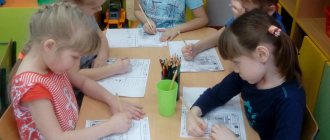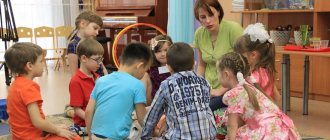Quest as a modern pedagogical technique in older preschool age
A person is then in the full sense a person if he is a person who plays, and therefore creates, that is, creates his own world in the game.
F. Schiller
According to A. Gin, “Pedagogical techniques are the basis of successful teaching and the teacher’s ability to constantly improve a modern lesson, find new approaches to teaching students that allow them to increase cognitive interest in the subject being studied and the quality of students’ knowledge” [4]. The development of a child occurs due to his active activity. The basic principles of the educational program for preschool children are implemented during classes through methods and techniques for teaching preschoolers. In this case, the method should be considered methods of influencing or transferring knowledge. Techniques are implemented thanks to variants of application of a certain method. Therefore, methods and techniques for teaching preschoolers can be practical, visual, verbal and playful.
One of the most interesting and close forms of organizing the pedagogical process for students is play. The Great Soviet Encyclopedia notes: “Game is a type of meaningful unproductive activity, where the motive lies not in its result, but in the process itself” [5].
Through play, the teacher helps the child gain the necessary motivation, which should be based on individual needs, provide freedom of choice, and provide the opportunity to acquire the necessary knowledge and skills.
The role of play activity and children's play as such in solving problems of the comprehensive development and education of preschool children is indisputably recognized in pedagogy.
Play for a child is the most attractive, natural form and means of learning about the world, their capabilities, self-expression and self-development. For a teacher, a meaningful, properly organized game that meets the interests of children is an effective pedagogical tool that allows them to comprehensively solve a variety of educational and developmental tasks.
In the game, a child is comprehensively prepared for life, from which it follows that games are associated with all types of human activity and act as a specifically children's form of knowledge, work, communication, art, and sports.
The originality of the modern pedagogical process of kindergarten is predetermined by new requirements for preschool education. The Federal State Educational Standard states that pedagogical interaction between a child and raising adults should be focused on ensuring the development of each child, preserving his uniqueness and identity, creating opportunities for the development of abilities and inclinations.
But you should not reduce the importance of the child’s motor activity for his harmonious development. The integration of these types of activities makes it possible to successfully solve the problems of forming a motor culture, developing children’s physical abilities, introducing a healthy lifestyle, health preservation and health formation. These conditions are implemented most effectively during quest games.
In modern conditions and approaches to preschool education in accordance with the Federal State Educational Standard for Preschool Education, quest games are quite relevant. According to the authors Gavrishova E.V., Milenkova.M. “Quest games are a new way of interaction in independent, playful activities of children, promoting cooperation between adults and children, their initiative and independence. Currently, a variety of innovative technologies are actively used in preschool education. It should be noted that the quest technology is relevant in the context of the requirements of the Federal State Educational Standard for Educational Education. This is an innovative form of organizing children's educational activities in preschool education, which contributes to the development of the child's active activity position in the course of solving game search problems. Thus, a quest - a game - is a child’s activity in which he, independently or together with an adult, discovers new practical experience and acquires knowledge” [3].
Quest technology in the educational and general educational process as a concept appeared relatively recently. It must be said that not only child psychologists played a big role in this, but also computer games of the quest genre that appeared a couple of decades ago. Let's try to consider the main aspects related to understanding this process, not from a scientific point of view, but let's talk about this topic in a universal human language, so that everyone can understand, for example, what quest technologies are in the education and upbringing of the younger generation.
It should be noted according to Bachurina. V., that “the modern world is very eventful and many different organizations are ready to offer the child interesting forms of pastime, which makes the already classic forms of organizing the pedagogical process less attractive and evoking less vivid emotions among students. And, as you know, without interest there is no result or it is achieved to a lesser extent” [2].
In this situation, the quest game acts as an assistant to the teacher in organizing the pedagogical process and implementing the assigned pedagogical tasks in a form that is unusual for students, thereby increasing their interest and emotional return.
““Quest” or “Adventure game” (translit. English: Quest - search, Adventure - adventure) is one of the main genres of games that require the participant to solve mental problems to advance through the plot. The plot can be predetermined or give many outcomes, the choice of which depends on the actions of the player.
The concept of “quest” in pedagogical science is defined as a specially organized type of research activity, for which the student searches for information at specified addresses (in reality), including the search for these addresses or other objects, people or tasks” [6].
The relevance of using quests today is recognized by everyone. The new generation Federal State Educational Standard requires the use of activity-type technologies in the educational process. Life shows that modern children better assimilate knowledge in the process of independently obtaining and systematizing new information. The use of quests contributes to the education and development of personality traits that meet the requirements of the information society, the discovery of abilities and the support of children's giftedness.
The concept of “quest” was first used as a literary term. This is the name of a method of constructing a plot, where the achievement of a goal by the main character occurs through overcoming numerous difficulties. For example, any work by Jules Verne or Robert Stevenson. The quest is also the basis of N. Nosov’s fairy-tale trilogy “The Adventures of Dunno and His Friends.”
As the analysis of the terms showed, “quest (English quest), or adventure game (English adventure game) is one of the main genres of computer games, which is an interactive story with a main character controlled by the player. The most important elements of a quest game are the actual narrative and exploration of the world, and a key role in the gameplay is played by solving puzzles and tasks that require mental effort from the player. Quests are games in which the player needs to look for various objects, find a use for them, talk with various characters in the game, solve puzzles, etc.“ [7].
Quest game technology fits perfectly into the pedagogical process in preschool educational institutions. Quest - an activity can be intended for both group and individual work.
In the process of working on such a quest project, the student comprehends real processes, experiences specific situations, and becomes involved in penetrating into the depths of phenomena and constructing new processes and objects. From the point of view of information activities, when working on a quest project, its participant requires the skills of searching, analyzing information, the ability to store, transmit, compare and synthesize new information based on comparison.
But the highlight of this organization of play activity is that, having completed one task, children receive a hint to complete the next one, which is an effective means of increasing motor activity and motivational readiness for cognition and exploration.
The popularity of quest games and their success among children can be explained by two reasons. Firstly, this is an enjoyable activity for the child. Secondly, the player understands the significance of its immediate result for himself. It can satisfy personal needs for goal achievement, dominance, independence, and the desire to be in the company of others.
An open quest lesson is held in kindergarten in order to demonstrate to colleagues, as well as parents of their students, positive practical developments in the use of modern gaming technology. The teacher visually presents original ways of organizing and conducting a quest game, original scenario ideas and teaching aids, presents a set of interesting tasks, shares teaching experience, invites to discuss innovative methods and exchange opinions.
Choosing a topic for open display or the preparation process is no different from working on a regular activity in the quest game format, and yet an open quest activity must meet certain conditions:
High level of professional training of the teacher conducting the quest game.
Focus on educational work with teachers and psychologists, including methodological master classes and the transfer of innovative experience in the process of the final discussion of the quest methodology.
Presentation of the results of the teacher’s work within the framework of the topic of self-education on the use of interactive games in working with students.
Demonstration of the effectiveness of gaming technology that meets the requirements of the Federal State Educational Standard.
The need for psychological preparation of children for the presence of a large number of strangers.
The main criteria for a quality quest are:
compliance with safety rules;
originality of the theme and script;
consistency of tasks and integrity of the plot;
creating an attractive and vibrant play space.
Quest game technology is constantly used by a physical education instructor and a speech therapist teacher in classes in kindergarten No. 14 “Spikelet” in the village of Bobrovy Dvory
During these games, a comprehensive solution to problems proposed by T. S. Ovchinnikova is provided, such as:
“Educational
‒ to expand and consolidate children’s knowledge about a healthy lifestyle from childhood, to bring them to the understanding that every person should take care of their health from childhood.
‒ teach, clarify and consolidate knowledge about sports, personal hygiene skills, healthy and unhealthy foods, knowledge of sports and physical education for a healthy lifestyle, form children’s ideas about the dependence of health on physical activity, hardening, and adherence to a daily routine.
‒ learning to solve educational problems by conducting experiments;
- training in independent inference;
- teach how to conduct sound analysis of a word;
‒ teach how to compose a story according to a diagram - strengthening the skills of working with non-traditional material;
- consolidation of temporary ideas.
Developmental
- develop the ability to communicate freely with children and adults,
‒ develop the ability to enter into dialogue, expressive speech, promote verbal communication in children;
- create an atmosphere of emotional comfort, improve the mood of children;
- development of imagination, attention, thinking, speech, memory;
- develop logical thinking, strengthen comparison and generalization skills;
- develop fine motor skills;
- develop communication skills, independence, and a friendly attitude towards peers.
‒ develop children’s aesthetic senses, artistic perception, promote the emergence of a positive emotional response to literary and musical works
Educating
‒ cultivate the will to win, curiosity, cognitive activity
‒ fostering positive moral qualities: kindness, responsiveness, desire to help.
‒ developing cooperation skills;
- nurturing independence, initiative, responsibility;
‒ to cultivate interest in creativity, the desire to give joy to others, collectivism, cultivate perseverance, and mutual assistance” [8].
All these tasks were carried out by us throughout the year at various quest games such as: “Healthy lifestyle - visiting the Borboskins”, “Travel to the country of Vitaminia”,
“Journey to the country of Sportlandia”, “Let’s help Smeshariki find treasures” - where children moved from one task to another, throughout the entire territory of the kindergarten building.
Many games were played outside, where tasks were located in all areas of the kindergarten. "In Search of the Mystery of Tortilla Turtle", "Hotel for Insects",
"Vegetable garden suffering."
In the quest game “Let's teach Dunno the rules of the road,” children consolidated their knowledge of traffic rules, played out various situations and found the right solution.
“Across the seas - along the waves” the guys happily went on a sea voyage with the captain.
In the games “My Motherland is Russia,” children from the preparatory group completed tasks related to knowledge of the country. And in the quest game “My Belgorod Region” with knowledge of the native land.
The children of the older group went on a journey to gain knowledge about animals and the place where they live in various regions of the planet: Quest games “Happy Jungle”, “The North Pole - what is it like”, “The hottest place on the planet is the desert”, “Four-story taiga” and etc.
We also visited outer space with our students, the trip - “Belka and Strelka need help”, “Parade of the Planets”.
In September 2022, a game was held with the invitation of first-graders from the Bobrovodvorsk secondary school. Where the total number of participants was 30 people, the children were divided into three teams. The duration of the quest was 1 hour, during which each team walked from station to station a certain route with a total length of 1.5 km.
Quest is an adventure game, a game with “secrets” and discoveries, so it is always emotionally rich and brings pleasure to preschoolers. Such a game involves the interaction of personality and situation.
It is worth noting that the tasks in the quest require intelligence and non-standard problem solving, which means that the game will develop the mental abilities of children. Overcoming the difficulties provided by the plot, they master a lot of new interesting information. A quest can be thought of as a process of cognitive processing of a situation that contains emotional components and pushes one to achieve a goal. There is always something similar to a “striving for completion” in it, that is, a desire that grows over time to bring the process to some conclusion.
As a result, I would like to emphasize the following: quests, as a rule, are a group game, which is also a big plus. To win, you need to learn interaction, mutual assistance, and the ability to make compromise decisions. In addition, if you have to be responsible not only for yourself, but for the victory of the entire team, the game becomes much more exciting. Such adventure games require a certain dexterity, endurance, and strength. It is better to play the game outdoors; it necessarily includes tasks related to running, climbing, throwing, jumping, and balance, thus improving the health of children. All together this creates an atmosphere of adventure, a fun game, is remembered with vivid impressions, and brings joy to preschoolers.
From the above, it becomes obvious that any quest technology is designed not only to improve the perception of, say, educational material or to contribute to the moral development of the child as an individual, but can also stimulate the mental and moral development of children. In addition, at its core, such a technique has a double meaning, oddly enough, from two mutually exclusive rules: the search for correct logical thinking and the use of non-standard methods to solve the problem. But if you dig into history, you can find a lot of individuals who used not only a purely scientific approach to solving a problem.
Literature:
- Andreeva, A. D. The problem of play motivation of modern children // Journal of practical psychologist. — 2008 — No. 5.
- Bachurina, V. Educational games for preschoolers. - M. LLC IKTC "LADA", 2007. - 176 p. — (Series “A talented teacher - a caring parent”).
- Gavrishova E. V., Milenkov. M. Quest - an adventure game for children // Directory of a senior teacher of a preschool institution. — 2015 — No. 10
- Gin. A Techniques of pedagogical technology (https://docplayer.ru/30465089-Priemy-pedagogicheskoy-tehniki-nekotorye-priyomy-pedagogicheskoy-tehniki-po-a-ginu.html)
- Game (type of activity) - article from the Great Soviet Encyclopedia.
- Quest - https://ru.wikipedia.org/wiki/Quest
- Quest game - https://ru-wiki.ru/wiki/Adventure_game
- Ovchinnikova T. S. Organization of health-preserving activities in preschool educational institutions - KARO, 2006–176p.
Quest technologies in preschool educational institutions
In accordance with the law “On Education in the Russian Federation”
Preschool education has become an independent level of general education, which significantly increases the requirements for it. The developmental interaction of a child with adults and peers is the main didactic technology of the Federal State Educational Standard for preschool education. A preschool child is a person who plays, and therefore learning enters his life through the “gate of children’s play.”
Modern pedagogy invites us to shift the emphasis from passive
learning models (the child acts as an “object”, simply listens and
looks) at active (the child acts as a “subject” of learning, i.e. works independently, performs creative tasks) interactive (the child interacts with other participants in the educational process).
Educational activities in the quest format fit perfectly into
the concept set by the Federal State Educational Standard for Education. And it becomes an excellent opportunity for teachers and children to organize life in kindergarten in an exciting and original way.
So what is a “quest”? Where did he come to us from? And what are we
what do we mean when we talk about quest technology?
If we turn to the dictionary, then the very concept of “quest” can be interpreted as “search” or even “adventure”.
A quest is a form of interaction between a teacher and children that promotes
formation of skills to solve certain problems based on choice
options, through the implementation of a certain plot. The quest game involves the integration of various types of children's activities, which is one of the requirements of the Federal State Educational Standard for Additional Education to the structure of the educational program of additional education and its volume (chapter 2, clause 2.6)
This type of activity was developed in 1995 in the state
University of San Diego (USA) by researchers Bernie Dodge and Tom March. The ancestors of “real” quests are computer games. The first attempt to transfer a virtual computer quest to reality was made in Asian countries in 2007, after which it began to be introduced in Europe, and then in Russia (2013).
According to many scientists (Bykhovsky Ya.S., Bovtenko M.A., Sysoev P.V., B.
Dodge, T. March, etc.) the basis of quest technologies is the activity of
formation of information and communication competencies
preschoolers.
When using quest technology, children go through a full cycle
motivations: from attention to satisfaction, get acquainted with authentic
material that allows them to explore, discuss and consciously build new concepts and relationships in the context of real world problems, creating projects of practical relevance. Quest, as recently
defined pedagogical technology, combines elements
brainstorming, training, games, and accordingly, solves a number of problems,
assigned to the above technologies.
Irina Nikolana Sokol considers Quest as a technology that has a clearly defined task, a game plan, necessarily has a leader (mentor), clear rules, and is implemented with the goal of increasing children’s level of knowledge and skills.
When using Quest technology, children emotionally experience all stages of interest: from attention to satisfaction, get acquainted with the material in an unconventional form, which allows them to explore, discuss and consciously build new concepts and relationships in the context of real world problems, creating projects that have practical significance.
Quest technology is relevant in the context of the requirements of the Federal State Educational Standard for Educational Education;
promotes the development of an active, active position of the child during
solving game search problems. The content of various
educational fields, uses the capabilities of ICT and modern
educational technologies.
Quests have a large number of advantages for children
preschool age, which in many areas are completely
comply with Federal State Educational Standards for Preschool Education: quests are carried out naturally
integration of educational areas, combine different types of children's
activities and forms of work with children. Quests allow you to unite everyone
participants in the educational process (children, parents of students and
teachers) in solving educational problems in game plot and
in an entertaining way.
The main advantage of the quest is that this form of organizing educational activities, in an unobtrusive, entertaining way, helps to activate the cognitive and thinking processes of the participants. With the help of such a game, you can achieve educational goals: implement project and game activities, introduce new information, consolidate existing knowledge, practice children’s skills.
Thus, children's quests
help to achieve the following tasks:
educational
— participants acquire new knowledge and consolidate existing ones;
developing
– during the game, children experience an increase in educational motivation, development of initiative and independence,
creative abilities and individual positive psychological qualities, the formation of research skills, self-realization of children;
educational
– skills of interaction with peers, goodwill, mutual assistance and others are formed.
The following types of quests can be distinguished:
— linear, when problems are solved in a chain, one after another;
- assault, when participants receive a task, tips for solving it, but
they choose the solutions themselves;
- ring ones, when this is the same linear quest, but enclosed in a circle. In that
In this case, teams of participants start from different points, and each follows its own path to the finish.
By type of educational objectives
(classification by B. Dodge and T. March).
Quests can take the following forms:
— creating a presentation, poster, story on a given topic;
- planning and design - developing a plan or project based on
specified conditions;
— transformation of information received from different sources;
— search and systematization of information;
Any quest requires careful preparation of the teacher. Preparation
carried out in 3 stages:
— preparation of conditions, equipment, quest materials;
— development of a route and map, quest script;
- preparing children (familiarization with the topic, immersion in the topic, training,
a game).
Quest games in the educational process, which is built systematically, step by step in four directions:
- work with children,
- working with parents of students,
- methodological support,
- creation of a developing subject-spatial environment.
Quests are held in a variety of places: in a group, in a hall, in a museum, quests
in nature, on the site, on excursions.
Quest games are used as part of continuous educational
activities with children.
Quest - the game activates the active inclusion of parents of students in
educational process. Parents are active partners, and in
some quest games and participants, and this is one of the main tasks, which is prescribed in the law of the Russian Federation “On Education” and the Federal State Educational Standard for Education.
In the process of introducing quest technology into practice in kindergarten:
- is being created
an atmosphere of emotional uplift and emancipation for everyone
participants in the educational process;
— educators and specialists began to show sincere interest
in children's achievements;
- children develop confidence in themselves and their comrades;
- older preschoolers know how to listen and hear each other, express their
opinion, negotiate, come to an agreement; children have developed speech
interaction; a positive attitude towards the surrounding world has been formed,
to other people, to oneself, to peers; children know how to defend their
position, reasonable and kindly object to adults.
Thus, the quest becomes an excellent opportunity for a teacher and
children to organize life in kindergarten in a fun and original way. The quest, with its almost limitless possibilities, provides invaluable assistance
teacher, providing the opportunity to diversify educational
educational process, make it unusual, memorable,
exciting, fun, playful.
Quest experience
Municipal budgetary preschool educational institution
d/s ORV “Malysh”, Usman
Experience on the topic:
“Quest technology in the educational process of preschool educational institutions”
Prepared by: Demikhova Lyudmila Yurievna
2020
Relevance
: From birth, a modern child is surrounded by a rich information environment. Computers, game consoles, and electronic toys occupy an increasingly important place in the life of a preschooler. It is increasingly difficult to surprise modern children with anything. This, of course, leaves a certain imprint on the development of the child’s personality. I try to keep up with the times and use modern means of training and development, new pedagogical methods and technologies, and original forms of educational activities in my work. The most appropriate technology for the needs and interests of preschool children, in my opinion, is quest technology, which meets modern requirements and preserves play in the space of preschool childhood.
In English, “quest” means “search”, “wanted object”. Quest technology is considered as an interactive educational environment for enhancing the educational activities of preschool children. Over the past two years, this form has been of interest to me and to the specialists of our preschool educational institution.
The main feature of the quest is the goal, which can be reached by consistently solving riddles. Each riddle is the key to the next point and the next task.
Tasks can be very different: research, creative, cognitive, intellectual. Novelty: Quest technology - relevant in the context of the requirements of the Federal State Educational Standard for Educational Education; promotes the development of an active, active position of the child in the process of solving game search problems. The content of various educational areas is integrated, and the capabilities of ICT are used.
Quests have a large number of advantages for preschool children, which in many areas fully comply with the Federal State Educational Standard for Education: quests naturally integrate educational areas, combine different types of children's activities and forms of work with children. Quests allow you to unite all participants in the educational process (children, parents of students, educators, specialists) in solving educational problems in a playful and entertaining form.
The purpose of my work
: to create conditions for interactive interaction of all participants in the educational process through setting search tasks in the course of organizing activities through a certain plot.
In order to achieve this goal, I solved the following tasks:
-Identified the advantages and features of using quest games in working with preschool children;
— Included a quest game in the practice of working with preschool children;
— Ensured the relationship between all participants in the educational process (children, parents, teachers, specialists) through the inclusion of quest games in the work.
The theoretical basis of my work was the research of domestic and foreign scientists and teachers. Sokol I.N. in her works she described the basic conditions for preparing quests for preschoolers, which distinguish children's educational quests from quests for adults. She highlighted the features of children's quests, and for organizing and conducting quests she developed the structure of quests and an algorithm for their construction. She described in detail the principles that must be taken into account when developing them.
Having studied this technology, talked with the author and creator of quest games, Yu. Lugovskaya, for the past two years I have been incorporating quest games into the educational process, which I build systematically, step by step in four directions: working with children, working with parents of students, working with teachers, creation of a developing subject-spatial environment. I use quest games as part of continuous educational activities and leisure activities with children. I conduct most of the quests with the active participation of the students’ parents.
I conduct quest games with children of the second junior and preparatory groups. Recommendations for conducting continuous educational activities with children 6-7 years old using a didactic manual are very popular among my colleagues.
Of particular interest to my students are thematic quests, such as “In Search of Treasures”, “In the Footsteps of Bigfoot”, “Journey to the Queen of Mathematics”, “In Search of Wild Animals”, I conduct quests to teach children traffic rules, “Young Driver” ", "On the path of safety." The role of quest technologies in the modern world simply cannot be underestimated. Of course, it is possible to force a child to cram, but, as you know, nothing good will come of it. Roughly speaking, he will remember a certain uninterpreted set of knowledge, but when an understanding of this or that process comes, that’s a different matter. And, I must say, children are sometimes able to remember material even on a subconscious level. And if the process is also presented in a playful form, then no one will refuse to participate in it.
In kindergarten, with my colleagues, I organize creative, educational, literary, and sports quests. The quest dedicated to the Day of Knowledge “Journey to the Tree of Knowledge”, which was conducted with the participation of parents, became interesting and memorable. To familiarize teachers with quest technology, various master classes were held, such as “Quest about quests,” “5 steps to mastering quests,” a workshop on “basic approaches to quest technology and experience of its use in the educational process,” and a survey.
Quests have become an interesting basis for methodological support for the implementation of the Federal State Educational Standard for Education in working with teachers. Quest technology has found its application in working with parents of students. Conducted and compiled recommendations for holding parent meetings in quest format.
The highlight of my experience is the manuals for conducting quest games. Quests require a lot of preparation, a well-thought-out subject-spatial environment, a large number of details that will encourage children to independently search for and solve problem situations. The first developments on this topic showed that in the process of introducing quest technology into practice in kindergarten: - an atmosphere of emotional uplift and emancipation is created for all participants in the educational process; — educators and specialists began to show sincere interest in children’s achievements; - children develop confidence in themselves and their comrades; the feeling of fear for making a mistake is removed - children of the preparatory group know how to listen and hear each other, express their opinions, negotiate, come to agreement; Children have developed speech interaction; a positive attitude towards the surrounding world, other people, oneself, and peers has been formed; children know how to defend their position and object to adults reasonably and kindly; they have no sense of fear for making a mistake. Thus, the quest became an excellent opportunity for me and the children to organize life in kindergarten in a fun and original way. Quest provides me with invaluable assistance, providing the opportunity to diversify the educational process, making it unusual, memorable, exciting, fun, and playful. Dear colleagues, if you are interested in my work experience, I will be very happy to share it with you.
Game quests as a cultural practice of supporting children's legal initiatives
GAME QUESTS AS A CULTURAL PRACTICE TO SUPPORT CHILDREN'S LEGAL INITIATIVE
- ; Teacher of MBDOU "Kindergarten No. 4 "Teremok" P. Novomaltinsk.
Abstract: the article discusses the role of legal knowledge, the formation of its foundations in preschool age, and the possibilities of using game quests to support children's initiative.
Key words: legal knowledge, preschooler, cultural practices, legal practices, game quests.
At the present stage of development of society, there is increased attention to the child as an individual. Increasingly, a child is perceived as a member of society who has certain rights, and protecting the rights of children is one of the urgent tasks.
note that the development of attention to the basics of legal knowledge, starting from childhood, is one of the characteristic signs of social progress and development of society, since progressive changes in society always presuppose the development of legal consciousness, legal knowledge of citizens, allowing them to follow their civic position [1] .
In modern society, a socially mature person, a free person, who has certain legal knowledge and knows how to apply it, is in demand. Conceptual approaches to the consideration of education at the moment are based on an understanding of the meaning of life and the purpose of a person. At the same time, the main value is understanding the capabilities of a person as the creator of his own life. Primary ideas about social norms of human behavior, the need for a certain order in human relationships, and the organization of society are formed in the preschool period.
The formation of the foundations of legal knowledge is an important basis for the development of legal consciousness. Despite the fact that in preschool age children only develop elements of legal consciousness, the development of prerequisites that are associated with the formation of certain legal knowledge and the readiness to apply this knowledge in specially created educational situations and spontaneously arising life situations is one of the urgent tasks.
The formation of the foundations of legal knowledge in children in preschool age can be carried out through cultural practices. In a number of modern studies (, etc.) devoted to the problems of implementing the cultural approach, the essence of cultural practices, their meaning, and their types are determined. Cultural practices represent a variety of independent activities, behaviors and experiences based on current and future interests [4,5].
In this work, cultural practices are understood as situational, autonomous, independent, initiated by an adult or the child himself, the acquisition and repetition of various experiences of communication and interaction with people in different groups. Cultural practices in a preschool setting are implemented in the afternoon. They are focused on creating conditions for children to demonstrate independence, activity and initiative in various types of activities [5].
The main importance of cultural practices is to create an atmosphere of freedom of choice, self-expression and cooperation between adults and children. One type of cultural practice is legal practice. These are practices of a child’s readiness to defend their rights and the rights of other people, using for this knowledge their rights and freedoms and the ability to implement them.
As an analysis of psychological and pedagogical research shows, the use of legal practices in working with preschool children contributes to the development of children's respect and tolerance for each other, the formation of self-esteem, awareness of their rights and freedoms, the development of a sense of responsibility, the development of the ability to control their behavior, inclusion into activities that comply with generally accepted norms and rules.
Legal practices allow not only to enrich, systematize and consolidate the foundations of legal knowledge in children, but, most importantly, to develop the ability to implement their knowledge in different situations, which is helped by the experience gained in the process of joint activities with adults.
Legal practices can be carried out using different technologies. One of such technologies, in our opinion, can be game quests.
“Quest” translated from English means “adventure”, “game”, and is one of the genres of computer games in the form of an interactive story with a main character controlled by the player. In game crosses, participants need to look for various objects, find a use for them, talk with characters in the game, solve puzzles, move around the map, etc.[2]
Quests are a group game. The main idea of the quest is that the participants, moving around certain points, in accordance with the map, complete different tasks. A distinctive feature of this organization of gaming activity is that completing a task helps children receive a hint and move on to the next task.
Conducting game quests in preschool educational institutions is based on taking into account a number of principles. These include: the principle of safety (all objects in the game and play actions must be safe), the principle of appropriateness to age and individual characteristics, the principle of respect for the dignity of the child, the principle of constant change of activities, the principle of connectedness, consistency and logic, the principle of emotional coloring of the game.
Game quests come in different types. According to the number of participants, they are divided into single and group, according to duration they are short-term and long-term, according to content - plot and non-plot.
The structure of the plot in a game quest can be different: linear, assault, circular. The linear structure of the plot of the game quest is built along a chain: solving one task entails receiving the next task until the participants reach the finish line. The assault plot structure is characterized by the fact that each player solves a chain of riddles in order to put them together at the end. The ring structure of the plot is different in that the trajectory of the participants is circular - by completing certain tasks they return to their original point again and again.
Game quests can also vary in form. In particular, they can be presented as competitions, projects, research, experiments.
In the game quest, children receive various tasks related to finding “treasures,” investigating incidents, helping heroes, traveling, and adventures based on works of fiction.
Preparing a game quest contains a number of stages. The first stage involves defining goals and objectives and choosing a location for the game. The second stage includes drawing up a map of the route or passport of the stages, forming a composition of participants. The third stage is the development of the game legend, its format, rules, writing a script, preparing props for the game. The fourth stage is the game itself.
The attractiveness of game quests for use with preschool children lies in their potential. First of all, game quests help to activate children’s attention, develop their cognitive interests, and develop cooperation skills. A game quest is a special multilateral type of communication that occurs both between the teacher and children, and between children.
During the game quest, it is possible to integrate different educational areas, use different types of children's activities, forms of work with children, which significantly expands the possibilities of the game quest in solving various educational, developmental and educational problems.
Of no small importance is the use of game quests to develop children’s independence and initiative, which is important in the context of developing the foundations of legal knowledge.
Thus, the analysis of the problem showed that game quests act as a cultural practice of supporting children's legal initiative, since in game quests children can not only consolidate the legal knowledge they have acquired, but also, most importantly, learn to apply this knowledge in different situations. As a result, children will develop meaningful experiences that will allow them to adapt more effectively in society.
Literature
Gan, monitoring the process of legal education of older preschoolers: author's abstract. dis. ...cand. ped. Sciences: 13.00.07/. Ekaterinburg, 2002 218 p. Komarov, in the system of educational work of kindergarten / , . Moscow: Mosaika-Sintez, 2014. – 128 p. Krylov, cultural approach in modern pedagogy // Personality in the sociocultural dimension: history and modernity: Sat. articles. M.: Indrik, 2007. –S. 132–138. Lykova, practices in kindergarten: modern approach and possible interpretations / , E. Yu, Protasova // Scientific and methodological journal “Kindergarten: theory and practice”, 2015. – No. 5. – P. 6–18. Maslovskaya, and the practice of developing cultural and anthropological practices of preschool children: Textbook /. M: FLINT Publishing House, 2014. – 108 p.
Get text






